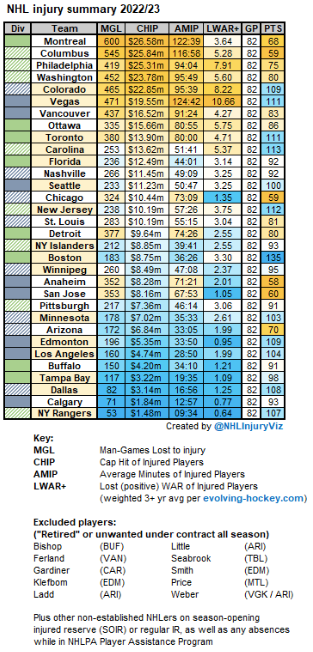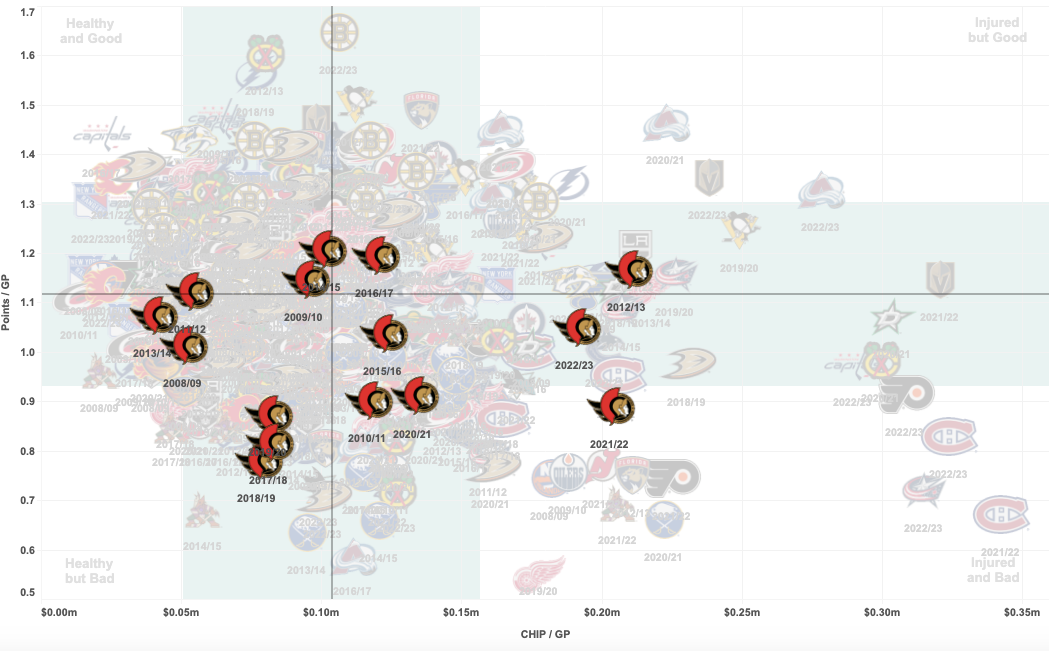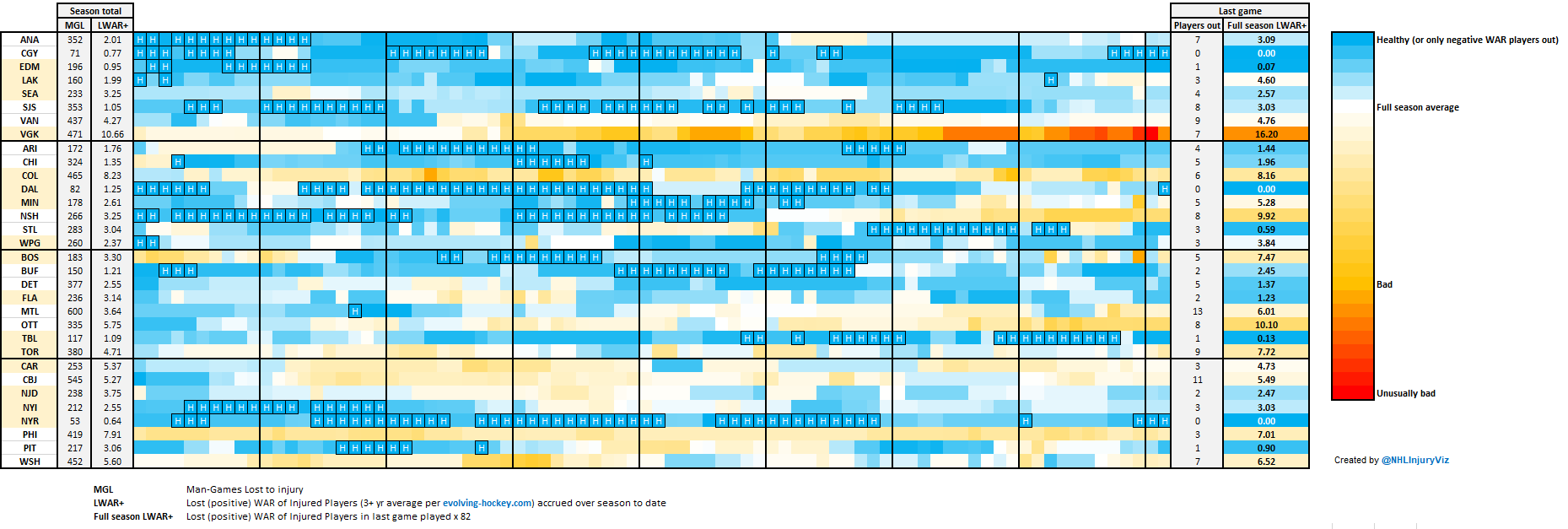Were the Ottawa Senators Actually That Injury-Plagued?
Many fans rationalized the team's failures by pointing to injuries---but were the Senators actually abnormally unhealthy this season?

We all heard the narrative all year long: "Well if this team was healthy, they could be in a playoff spot." Is it true?
The Ottawa Senators missed the playoffs by just six points, so to clear that bar, all they needed to do was take three regulation losses and turn them into wins, plus turn one overtime/shootout loss into a win. It's a small enough margin that one could reasonably say "If Josh Norris and Anton Forsberg were healthy, they would've made a wildcard spot." In that narrow sense of the question, yes, it's almost certainly true that the Sens would have made the play-offs if everyone was healthy for the full year. But full health for an entire team is not a realistic proposition, that would be incredible good luck of its own, so we need to answer the real question:
Were the Senators actually injury-plagued on a comparative basis?
The Source
If you don't follow @NHLInjuryViz on Twitter, you should. It's pretty self-explanatory: they display visuals based on team injury data. Their website has data all the way back to 2000, and I suggest you play around with it there if you're interested—or very bored, no judgement from someone who just wrote a whole piece about this topic.
They use things like "man games lost" for teams based on how many games they lost from NHL regulars, CHIP (cap hit of injured players), LWAR (lost WAR of injured players), AMIP (average minutes of injured players), and other methods in order to show who has been the most affected by injuries. Obviously, there is no perfect method to measure these things, because cap hit doesn't 100% correlate with the best players, WAR can underrate certain players, and ice-time overrates others. However, there isn't really anything better out there, and if we look at multiple metrics from this site, you can get a pretty good idea of the range that a team should be in for injury luck (or lack thereof).
The Evidence
There are many things to look at here, and let's start with raw man games lost. This tweet shows many different metrics, which I'll go over. MGL isn't quite in order, but I'll start there: the Senators have 335, which is 12th most in the league:

That's certainly not a low total, although it's not incredibly high either like Montreal with 600 or Columbus with 545. On the other end of the spectrum, the New York Rangers (53), Calgary Flames (71), and Dallas Stars (82) were incredibly healthy and lucky. In terms of CHIP, Ottawa ranks 8th highest. High cap hits such as Josh Norris, Anton Forsberg, Cam Talbot, Thomas Chabot, Nikita Zaitsev, and Artem Zub missing time heavily contributed to that ranking.
Ottawa's average minutes of injured players (AMIP) is at 80:55, which also ranks 8th—high but not outrageously so. Lastly, where they have the best case to say "what if?" is the LWAR+ section. They're at 5.75, which is 4th only behind Philadelphia, Colorado, and Vegas. The Golden Knights lost Robin Lehner, Mark Stone, and Shea Theodore for extended periods of time, so their incredibly high LWAR+ of 10.66 makes sense. There's no doubt about it, Ottawa had some amount of poor luck with their injuries this season.
If we look at Ottawa's results since 2008-09, they've been more injured twice (2012-13 and 2021-22) based on CHIP. As you can see though, this past season was quite close to the 2012-13 season that saw Erik Karlsson, Jason Spezza, Craig Anderson, and others miss significant amounts of time:

For Sens fans, it would be very interesting to compare against the team's extended run of post-season qualification from the early-to-mid aughts. What is worth noting, though, is the fact that two of their most injury-riddled seasons came in back-to-back years; one cannot assume good health after a year of bad luck.
It's fascinating to see how injured teams were throughout the season, as Ottawa was fine early on, but then got much worse in the middle section and then even worse at the end:

Some people might say that it's almost impossible to make the playoffs with as many injuries as Ottawa had, but that's just not true. While it's true that the best teams are typically quite healthy, many teams have to go through some injury adversity. Furthermore, the Colorado Avalanche and Vegas Golden Knights were more injured by every metric yet they won their divisions. The Toronto Maple Leafs also had more MGL and similar numbers overall but overcame those obstacles. The 2012-13 Senators only had to play 48 games, but they somehow had a 53.66 CF% despite missing their two best players for most of the season.
What Does it Mean?
With the caveat that no single metric captures the whole situation, considering the multiple sets of data we have looked at, it's safe to say that the Senators had some amount of bad luck in the health department this season. They were probably in the 5-10 range for most injured, and that puts any team behind the 8-ball. There's no doubt in my mind that if Norris and Forsberg can stay healthy, Ottawa's playoff chances will be much better next season. At the same time, injuries are unpredictable, and who knows what other players could miss games next season. After all, we were waiting for Shane Pinto this season only for Norris to essentially have the same thing happen to him.
With a team that has struggled with depth for years, being healthy is of utmost importance. Having Pinto play on the second line messed with the entire bottom six, but while injury luck didn't help, it's on the Senators for not having good enough depth to better help cushion the blow. Good teams don't necessarily have their seasons get derailed by a few injuries, and hopefully Ottawa will be able to overcome these things in the future.
This data is both comforting and also terrifying at the same time. On the one hand, you can look at this and think that the Senators got at least a little unlucky and that they're due for some positive regression. On the other hand, the universe owes us all nothing, and the difference between making or missing the playoffs can just be a couple of freak injuries during the season.
The conclusion is clear: this iteration of the Sens would have required very good health luck to make the play-offs, because their depth was insufficient when faced with moderately bad luck. Let's hope that Pierre Dorion (or whoever is the GM next season) has assembled a deeper forward group, or we'll need to be talking about their miraculous good health as they head into the playoffs one year from now.



